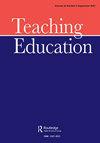以公平为幌子:利用白人教师的种族主义交流指导多样性课程修订
IF 1.1
Q2 EDUCATION & EDUCATIONAL RESEARCH
引用次数: 0
摘要
摘要在职教师寻求额外资格认证的研究生课程通常包括强制性的多样性课程。这类课程的目的之一是帮助教师认识到并消除他们的种族偏见,希望这种自我反思过程将使教师能够使用反种族主义的教学方法,并创建课堂社区,让所有学生都感到安全、尊重和公正地融入课堂。我们,两位从业者研究人员,都为在职教师教授了一门强制性研究生多样性课程的单独部分。教练展示我们比赛的照片(作者1:黑人,作者2:白人)是完全在线、异步课程部分的唯一区别。在经历/目睹了研究生通过发布在“询问导师”板上的非正式交流捕捉到的对黑人导师的种族偏见后,我们调查了学生的种族偏见是否会在分级课程中被捕捉到。使用文化历史活动理论(CHAT)和批判性种族理论(CRT),我们比较了每个课程部分学生的作业样本,发现学生的种族偏见没有被捕捉到。我们的研究结果有助于我们解决基于广泛中风公平框架的多样性课程问题。因此,我们使用CRT来提出课程修订,旨在帮助学生培养后种族主义心态,并致力于反种族主义实践。本文章由计算机程序翻译,如有差异,请以英文原文为准。
Masquerading as equitable: using white teachers’ racist communication to guide diversity course revisions
ABSTRACT Graduate programs for inservice teachers seeking additional credentialing often include a mandatory diversity course. One aim of these types of courses is to help teachers recognize and dismantle their racial biases in hopes that this self-reflection process will enable teachers to use antiracist teaching approaches and create classroom communities where all students feel safe, respected, and justly included in the classroom. We, two practitioner-researchers, both taught separate sections of one such mandatory graduate diversity course for inservice teachers. Instructor photos revealing our race (Author 1: Black, Author 2: White) were the only differences in the fully online, asynchronous course sections. After experiencing/witnessing graduate students’ racial bias towards the Black instructor captured via informal communication posted to the ‘Ask the Instructor’ board, we investigated whether students’ racial bias would be captured in graded coursework. Using both Cultural Historical Activity Theory (CHAT) and Critical Race Theory (CRT) we compared students’ work samples from each course section and found that students’ racial biases were not captured. Our findings help us problematize diversity courses hinged on broad-stroke equity frameworks. Thus, we use CRT to posit course revisions aimed at helping students develop post-racist mindsets and commit to anti-racist practices.
求助全文
通过发布文献求助,成功后即可免费获取论文全文。
去求助
来源期刊

Teaching Education
EDUCATION & EDUCATIONAL RESEARCH-
CiteScore
3.80
自引率
6.20%
发文量
15
期刊介绍:
Teaching Education is an interdisciplinary forum for innovative practices and research in teacher education. Submission of manuscripts from educational researchers, teacher educators and practicing teachers is encouraged. Contributions are invited which address social and cultural, practical and theoretical aspects of teacher education in university-, college-, and school-based contexts. The journal’s focus is on the challenges and possibilities of rapid social and cultural change for teacher education and, more broadly, for the transformation of education. These challenges include: the impact of new cultures and globalisation on curriculum and pedagogy; new collaborations and partnerships between universities, schools and other social service agencies; the consequences of new community and family configurations for teachers’ work; generational and cultural change in schools and teacher education institutions; new technologies and education; and the impact of higher education policy and funding on teacher education. Manuscripts addressing critical and theory-based research or scholarly reflections and debate on contemporary issues related to teacher education, will be considered. Papers should attempt to present research, innovative theoretical and/or practical insights in relevant current literature and debate.
 求助内容:
求助内容: 应助结果提醒方式:
应助结果提醒方式:


